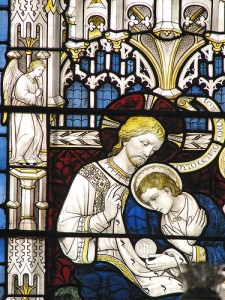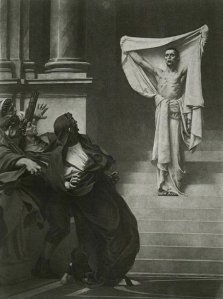In the catalogue of "gay saints", or pairs of supposedly "gay lovers" in Scripture, the coupling of John the Evangelist (the "beloved disciple") and Jesus himself is surely the most controversial. Many people, including some of my friends from the LGBT Soho Masses, find the whole idea that this may have been a "gay", sexually active relationship, highly offensive. Others argue the opposite case.
In an explosive book, "The Man Jesus Loved", the reputable biblical scholar Theodore Jennings mounts an extended argument that Jesus himself was actually gay and that the beloved disciple of John's Gospel was Jesus' lover. To support this provocative conclusion, Jennings examines not only the texts that relate to the beloved disciple but also the story of the centurion's servant boy and the texts that show Jesus' rather negative attitude toward the traditional family: not mother and brothers, but those who do the will of God, are family to Jesus. Jennings suggests that Jesus relatives and disciples knew he was gay, and that, despite the efforts of the early Church to downplay this "dangerous memory" about Jesus, a lot of clues remains in the Gospels. Piecing the clues together, Jennings suggests not only that Jesus was very open to homosexuality, but that he himself was probably in an intimate, and probably sexual, relationship with the beloved disciple.
-Daniel Helminiak, Sex and the Sacred
I find Jennings' argument (as summarised by Helminiak) fascinating, and look forward to reading the full exposition, and other views. Personally, I agree that Jesus was certainly "queer", in the sense that he was plainly a sexual non-conformist who did not conform to the social expectations of the time. It must be true that, as "fully human", he must have experienced sexual feelings. Even in Jewish society, if he had indeed given expression to these with another man, this would not have been exceptional: as long as he did not contravene that Leviticus prohibition on lying with a man "as with a woman" - i.e. with anal penetration. I also take it is true that he was clearly gay - friendly, as is clear from the story of the centurion, his words abut Eunuchs, and (possibly) his friendship with Martha Mary and Lazarus. So, to say Jesus and John were possibly sexually intimate lovers is to me not shocking, indeed possible - but also irrelevant.
The significance for us of John as "the disciple Jesus loved", goes way beyond the possibility of genital activity. Love is primarily an emotional relationship, not a physical one. The English language does us a disservice in using "lovemaking" as a euphemism for the physical act, even without any deep emotional significance. "Loving", in its full sense is more important than mere "lovemaking" as a physical act. In this sense, we know without any possible doubt that the words "whom Jesus loved" are true. How do we know it? Because they are true for all the disciples, as they are for each of us, and for all others.
One of the reasons I believe it is helpful to reflect on the saints is to see them as role models, that is, to try to imagine ourselves in their place, to try to follow their example. If we do this, actively imagining ourselves in the place of John, the beloved disciple, we may more easily see ourselves as we really are - beloved ourselves.
This is important fo all followers of Christ, but is even more important for us as lesbigaytrans Catholics and other Christians, who so often find ourselves under attack by those in the churches who really should know better. When we find ourselves under attack, on the receiving end of hate it is important to remember that this comes from human institutions, not from Christ himself - for whom we are all "the disciple(s) whom he loved."
There is one more reason to look to John as a role model. In addition to the beloved disciple, he is more widely recognized as an evangelist: and a very special evangelist. Now, evangelism is not just a task that ended with the writing of the Gospels, nor is it a task that we can leave to the missionaries and professional clergymen (or women). We all have a responsibility to assist in the evangelization process, spreading and interpreting God's word as proper to our circumstances. We should use the example of St John as inspiration to us to do just that. Now note more important feature. As an evangelist, John is the outsider. The other three wrote the synoptic Gospels, largely in narrative format, and largely agreeing with each other. John wrote something different, something more reflective and interpretative, not the "same old story" as the others. As gay men and lesbians, we too are outsiders. As outsiders, we necessarily see things a little differently, and it is not surprising that so many of us have made names as artists: in literature, music or visual arts. Artists are widely recognized as interpreters of society, so it is not far-fetched to see John in this sense as the "artist" among the evangelists. We do not need to see Jesus and John as being "gay lovers" to find value thinking of John, at least, as "gay", as the artist, the outsider.
If also, we find the idea of their (possible) physical lovemaking helpful to our own personal prayer life, that is good too. But if it does not lead to richer prayer, discard it as irrelevant.



